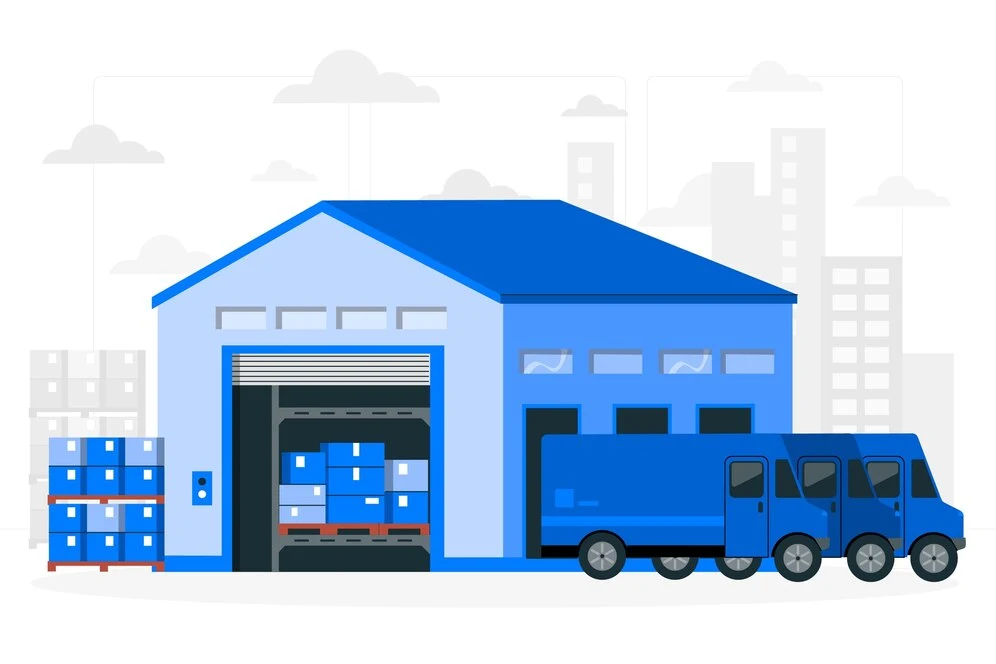ERP For Warehouse Industry: Transforming Operations through smart Automation
The warehouse industry has developed from a basic storage space to a crucial part of the supply chain in the world. In today’s highly competitive business environment efficient warehouse operations are essential for prompt delivery, precise inventory management and overall satisfaction of customers. Traditional methods of managing warehouses–spreadsheets, manual logs, or isolated software systems–are no longer sufficient. This is the point where ERP for warehouse industry is a game changer.
ERP or Enterprise Resource Planning, helps warehouses become more efficient, effective, efficient, and flexible by integrating their entire operations on a single platform. With the increasing expectations of customers, increasing competition, as well as the pressure to cut expenses investing in an efficient ERP system for managing warehouse systems isn’t a luxury, it’s a necessity.

Understanding ERP in the context of Warehousing
At its heart the ERP system integrates a variety of aspects of business like purchasing, inventory, finance, sales, as well as human resources onto one platform. When it comes to warehousing, ERP acts as a digital control tower that handles everything from inventory management and space utilization, to shipping planning and fulfillment.
With ERP software for warehouse companies can automatize their key operations and gain real-time insight and make informed decisions which improve efficiency and decrease human errors.
Why ERP is Important for Warehouse Industry
Warehouses today do more than simply storing items. They handle order picking, packaging inventory rotation, tracking and logistics. Hand-coordinating all of these tasks results in delays, loss of inventory or overstocking, as well as losses. Let’s examine the reasons ERP is the perfect solution with modern day warehouse processes.
- 1. Centralized Data Access
- ERP is a single point of the truth for every aspect of warehouse operations. From the inventory levels to the supplier records Everything is kept all in one place. This helps eliminate duplication, assures uniformity, and facilitates seamless collaboration between departments.
- 2. Real-Time Inventory Visibility
- Being aware of exactly what’s available and where it’s stored is crucial. ERP systems provide real-time inventory tracking that helps warehouses avoid stockouts and overstocking. This also increases the accuracy of forecasting and planning.
- 3. Automated order fulfillment
- Hand-picked orders and shipping procedures are susceptible to mistakes and delays. ERP automates the process of processing orders and ensures that the correct items are selected, packed, and shipped effectively. This increases customer satisfaction and lowers the rate of return.
- 4. Space Optimization
- Warehouse space can be expensive and frequently under-utilized. ERP systems study patterns of usage and to optimize storage and layout practices. This helps to maximize the use of space, and also reduces the operational cost.
Important Specifics to be found in ERP to manage Warehouses
Let’s take a look at the key attributes that a warehouse-focused ERP must have:
1. Inventory Management
ERP keeps track of the inventory levels of multiple warehouses, and monitors the movement of stock and sends alerts to ordering reorders. This helps ensure that items are readily available without having to hold up a lot of capital by holding stock in excess.
2. Barcodes as well as RFID Integration
Modern ERP systems can support barcodes and RFID scanning to allow real-time tracking. These tools speed up product identification, decrease the need for manual data entry and increase the accuracy of the process of receiving and shipping.
3. Support of Multi-Warehouses
For companies that manage multiple storage facilities, ERP allows centralized control using site-specific settings. It monitors inventory movements between warehouses, and provides consistent policies and procedures across all locations.
4. Tracking Orders and Shipments
ERP systems produce pick lists, handle packing slips, and connect with logistics service providers. This simplifies the process of shipping and keeps customers informed of their orders.
5. Repairs, Damage Handling and Returns
Returns and damages to merchandise are common in warehouses. ERP handles returns authorizations, restocking and damaged documentation, and also ensures seamless reconciliation with the vendors as well as customers.
6. Analytics as well as Reporting
Data is only valuable in the context of actionable insight. ERP systems provide comprehensive reports on turnover in inventory and accuracy of orders delivery times, order accuracy, and the efficiency of employees. These reports allow managers to discover bottlenecks and boost efficiency.
The Benefits that come with ERP Software for Warehouse Management
Implementing an ERP solution specifically tailored to warehouse operations has numerous advantages. Here’s how companies can benefit from such a solution:
1. Increased Accuracy and Efficacy
ERP helps reduce the amount of human involvement on repetitive tasks such as recording inventory, data entry or generating invoices. This helps reduce errors and speed the process.
2. Better Decision-Making
With centralized information and real-time analytics warehouse managers are able to make informed choices regarding staff planning, or stock clearance.
3. Improved Customer Satisfaction
Speedier order processing, more accurate deliveries, and less mistakes results in better service. A satisfied customer is often the basis for returning business and an improved reputation of the brand.
4. Cost Reduction
ERP can help control expenses by optimizing inventory levels, reducing waste, and minimizing expenses. It also reduces penalty charges and emergency procurement for delays in delivery.
5. Scalability
No matter if you’re managing just one warehouse or a cluster of storage centers spread across several areas, ERP systems can scale according to the demands of the needs of your business. Modules can be added as required without affecting operations.

The challenges of implementing ERP into Warehouse Operations
Despite the many benefits however, the implementation of ERP within a warehouse may be fraught with a few hurdles:
1. The High Costs of Initialization
The process of setting in place an ERP system requires a significant investment in hardware, software as well as education. However cloud-based ERP solutions can cut down initial expenses significantly.
2. Complex Integration
Integration of ERP with other software (like CRM platforms, eCommerce platforms, and logistics applications) is often complicated and long-winded.
3. employee training
The transition from legacy or manual software in favor of ERP is a process that requires education and management of change. The resistance of employees or the absence of training could lead to the system being under-utilized.
4. Customization Needs
Each warehouse is unique and has different requirements. Off-the-shelf ERP solutions could require modification to accommodate specific workflows, which could lead to a longer implementation and increase costs.
How to Select the Best ERP to Manage Warehouses? Warehouse Management
The selection of the most suitable ERP that can manage warehouses will depend on your business size, the complexity of your operations and your future objectives. Here are some suggestions for making the best choice:
1. Find Features Specific to Industry
Make sure that your ERP solution is compatible with the core warehouse functions like controlling inventory, managing orders and scanning barcodes.
2. Evaluate Scalability
Select a platform that will adapt to the needs of your company’s needs. Flexible ERP platforms are perfect for companies looking expansion or diversification.
3. Verify Integration Capabilities
Your ERP will be able to easily integrate with your existing systems, such as market place software for accounting, internet-based marketplaces or shipping providers.
4. Consider Cloud Deployment
Cloud-based ERP has advantages, such as lower costs upfront automated updates, as well as remote access. This is particularly beneficial for companies with remote warehouse networks.
5. Assistance and training for vendors
A dependable ERP vendor should offer ongoing technical assistance, training resources as well as customized services to facilitate the smooth running of your ERP.
Real-World Use Examples How ERP transforms Warehouses
Let’s look at the ways in which ERP can make an impact in actual warehouse operations:
Case Study 1: E-commerce Fulfillment Center
A company that manages more than 100,000 SKUs opted for an ERP system to improve their warehouse. The program automated order selection and updated inventory in real-time and also integrated with their website. The result was that the accuracy of orders was up by 30% and delivery times were reduced by 25%..
Case Study 2. Cold Storage Facility
The cold-storage facility which deals in perishable products employed ERP to monitor the shelf life of its products as well as make stock rotation more efficient (FIFO/LIFO) and to comply with safety standards. This reduced loss and enhance customer satisfaction.

The Future: what’s Coming on ERP in Warehousing?
With technology continuing to advance, ERP systems are becoming more sophisticated, adaptable, and efficient. Here are some trends to keep an eye on:
1. AI as well as Machine Learning
AI-driven ERP can help optimize the selection routes, predict the demand and even automate the process of reordering. Machine learning algorithms can be improved as time passes and make processes more efficient.
2. IoT and smart Sensors
IoT devices such as sensor for temperature, intelligent shelves and GPS trackers will be able to feed live data to ERP systems. ERP system, enhancing its accuracy and the speed of response.
3. Robotics Integration
Modern ERP systems integrate into warehouse automation devices, such as robotic pickers, as well as autonomous controlled vehicles (AGVs) that reduce human work and speeding up.
4. Mobile ERP Access
Warehouse workers can make use of tablets and mobile devices to access ERP functions while on the move, enhancing the accuracy of data entry and speed of response.
Conclusion
The warehouse industry isn’t simply about arranging items on shelves. It’s about speed and precision and efficiency. When you adopt erps for ware house industries operations, companies can improve their logistics chains in all aspects starting with inventory management to the shipping.
An effective warehouse management system allows for better planning, more intelligent decisions, and happier customers. If you’re operating a small storage unit or a global distribution center and warehouse, the best ERP system warehouse industry will serve as the foundation of your business, boosting efficiency and profit.
In the current competitive environment, using outdated systems can be a danger. The move to ERP software for warehouse management isn’t only a technological change, it’s an important decision that guarantees long-term achievement.

